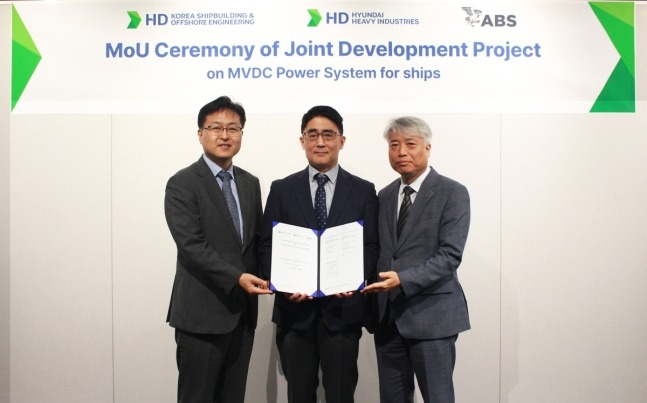Shipping & Shipbuilding
HD Hyundai, ABS to set standards for e-propulsion ships
With the new standards for high-voltage direct current transmission, both sides aim to increase energy efficiency by 20%
By May 03, 2024 (Gmt+09:00)
1
Min read
Most Read
Deutsche Bank's Korea IB head quits after country head resigns


Macquarie Korea Asset Management confirms two nominees


Hanwha buys SŌĆÖpore Dyna-MacŌĆÖs stake for $73.8 mn from Keppel


Korea's Taeyoung to sell local hotel to speed up debt workout


Meritz leaves door open for an M&A, to stay shareholder friendly



South Korea's HD Korea Shipbuilding & Offshore Engineering Co. (HD KSOE) and HD Hyundai Heavy Industries Co., partnered with the American Bureau of Shipping (ABS) to capture a large electric propulsion ship market.
HD Hyundai announced on Friday that the day before, they signed a cooperation agreement with ABS for shipboard high-voltage direct current (MVDC) classification regulations and research" at the Seongnam (Gyeonggi Province) HD Hyundai Global R&D Center.
MVDC is a technology that transmits high-voltage electricity between 1.5-100 kilovolts in direct current, attracting attention as the next-generation power supply technology due to its lower energy loss compared to alternating current transmission.
In particular, when applied to large electric propulsion ships, MVDC can improve energy integration efficiency by up to 20% compared to existing methods.
However, shipboard MVDC systems are still facing difficulties in commercialization due to the lack of international standards, HD KSOE and HD Hyundai Heavy Industries have signed an agreement with ABS to address these issues through collaboration.
Previously, HD KSOE built the first DC-based hybrid electric propulsion ship Ulsan Taehwa using a low-voltage direct current (LVDC) transmission system. The Ulsan Taehwa is a medium-sized ship weighing 2,800 tons.
Additionally, in collaboration with HD Hyundai Heavy Industries, HD KSOE received basic design certification from Lloyd's Register in the UK in Oct. last year for a low-carbon electric propulsion system for oil transport ships incorporating MVDC and high-capacity fuel cells (SOFCs).
Write to Jae-Fu Kim at hu@hankyung.com
More to Read
-
 MachineryHD Hyundai aims for worldŌĆÖs No. 5 spot in construction machinery
MachineryHD Hyundai aims for worldŌĆÖs No. 5 spot in construction machineryApr 26, 2024 (Gmt+09:00)
3 Min read -
 Shipping & ShipbuildingHD Hyundai, Philly Shipyard cooperate to enter US
Shipping & ShipbuildingHD Hyundai, Philly Shipyard cooperate to enter USApr 24, 2024 (Gmt+09:00)
1 Min read -
 Shipping & ShipbuildingHD Hyundai, Scottish firms to cooperate on offshore wind power
Shipping & ShipbuildingHD Hyundai, Scottish firms to cooperate on offshore wind powerApr 17, 2024 (Gmt+09:00)
1 Min read -
 Aerospace & DefenseHD Hyundai, Palantir team up for unmanned surface vehicle
Aerospace & DefenseHD Hyundai, Palantir team up for unmanned surface vehicleApr 14, 2024 (Gmt+09:00)
2 Min read -

Comment 0
LOG IN


